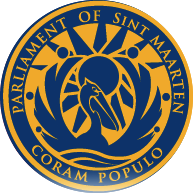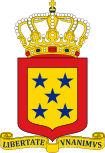
The politics of Antigua and Barbuda takes place in a framework of a unitary parliamentary representative democratic monarchy, wherein the sovereign of Antigua and Barbuda is the head of state, appointing a governor-general to act as vice-regal representative in the nation. A prime minister is appointed by the governor-general as the head of government, and of a multi-party system; the prime minister advises the governor-general on the appointment of a Council of Ministers. Executive power is exercised by the government. Legislative power is vested in both the government and the two chambers of the Parliament. The bicameral Parliament consists of the Senate and the House of Representatives.
The politics of Greenland, an autonomous country within the Kingdom of Denmark, function in a framework of a parliamentary representative democratic dependency, whereby the prime minister is the head of government, and of a multi-party system. Executive power is exercised by the government. Legislative power is vested in both the government and parliament Inatsisartut. The judiciary is independent of the executive and the legislature. Greenland has full autonomy on most matters, except on policies and decisions affecting the region including negotiations with the devolved legislatures and the Folketing.

The politics of Papua New Guinea takes place in a framework of a parliamentary representative democratic multi-party system, whereby the prime minister is the head of government. Papua New Guinea is an independent Commonwealth realm, with the monarch serving as head of state and a governor-general, nominated by the National Parliament, serving as their representative. Executive power is exercised by the government. Legislative power is vested in both the government and parliament.
Separation of powers refers to the division of a state's government into "branches", each with separate, independent powers and responsibilities, so that the powers of one branch are not in conflict with those of the other branches. The typical division into three branches of government, sometimes called the trias politica model, includes a legislature, an executive, and a judiciary. It can be contrasted with the fusion of powers in parliamentary and semi-presidential systems where there can be overlap in membership and functions between different branches, especially the executive and legislative, although in most non-authoritarian jurisdictions, the judiciary almost never overlaps with the other branches, whether powers in the jurisdiction are separated or fused.
The politics of Norway take place in the framework of a parliamentary, representative democratic constitutional monarchy. Executive power is exercised by the Council of State, the cabinet, led by the prime minister of Norway. Legislative power is vested in both the government and the legislature, the Storting, elected within a multi-party system. The judiciary is independent of the executive branch and the legislature.

The politics of the Netherlands take place within the framework of a parliamentary representative democracy, a constitutional monarchy, and a decentralised unitary state. The Netherlands is described as a consociational state. Dutch politics and governance are characterised by a common striving for broad consensus on important issues, within both of the political community and society as a whole.

Politics of Aruba, a constituent country of the Kingdom of the Netherlands, takes place in a framework of a parliamentary representative democratic country, whereby the governor in his capacity as the King's representative is the de jure head of government and of a multi-party system. Executive power is exercised by the government. Federal legislative power is vested in both the government and the Parliament. The Judiciary is independent of the executive and the legislature. Aruba has full autonomy on most matters. Exceptions are defense, foreign affairs, and the Supreme Court. The constitution was enacted in 1986.
Same-sex marriages are not performed in Aruba, Curaçao, or Sint Maarten, which are constituent countries of the Kingdom of the Netherlands. The islands were obliged after several court rulings to register any marriage registered in the Kingdom, but this primarily considers residency rights and they do not have to give same-sex marriages the same legal effect as opposite-sex marriages. Marriage in the European territory of the Netherlands, as well as in the Caribbean municipalities of Bonaire, Sint Eustatius and Saba, is open to any two people irrespective of sex.

The Government of Malaysia, officially the Federal Government of Malaysia, is based in the Federal Territory of Putrajaya with the exception of the legislative branch, which is located in Kuala Lumpur. Malaysia is a federation comprising the 11 States of Malaya, the Borneo States of Sabah and Sarawak, and 3 Federal Territories operating within a constitutional monarchy under the Westminster system and is categorised as a representative democracy. The federal government of Malaysia adheres to and is created by the Federal Constitution of Malaysia, the supreme law of the land.
The governor of the Netherlands Antilles was the representative of the Kingdom of the Netherlands in the Netherlands Antilles and the head of the government of the Netherlands Antilles.
A term of office, electoral term, or parliamentary term is the length of time a person serves in a particular elected office. In many jurisdictions there is a defined limit on how long terms of office may be before the officeholder must be subject to re-election. Some jurisdictions exercise term limits, setting a maximum number of terms an individual may hold in a particular office.

The Netherlands Antilles was an autonomous Caribbean country within the Kingdom of the Netherlands. It was dissolved on 10 October 2010.

The Kingdom of the Netherlands, commonly known as simply the Netherlands, is a sovereign state and constitutional monarchy with 98% of its territory and population in Western Europe and with several small West Indian island territories in the Caribbean.
Naalakkersuisut is the chief executive body and the government of Greenland since the island became self-governing in 1979. An autonomous territory of the Kingdom of Denmark, takes place in a framework of a parliamentary representative democratic territory, whereby the premier leads the cabinet, and of a multi-party system.

Antoon Arnold Marie "Teun" Struycken was a Dutch jurist and politician, co-founder of the Catholic People's Party (KVP) – now merged into the Christian Democratic Appeal (CDA).

The governor of Sint Maarten is the representative on Sint Maarten of the Dutch head of state. The governor's duties are twofold: he represents and guards the general interests of the kingdom and is head of the government of Sint Maarten. He is accountable to the government of the Kingdom of the Netherlands. As the head of the government, the governor is immune. The governor exercises the executive power under the responsibility of the ministers, who are responsible to the Estates of Sint Maarten. The governor does not have political responsibilities and is not part of the cabinet. During the formation of a cabinet the governor plays an important role. The governor is appointed by the monarch for a period of six years. This period can be prolonged for one more term of six years. The governor is supported by his secretariat the cabinet of the governor, and is advised by the Council of Advice, consisting of at least five members, appointed by the governor, advising him on the drafts of state ordinances, state decrees, kingdom acts and general administrative orders.

The Parliament of Sint Maarten is a unicameral legislature that consists of 15 members, each elected for a four-year term in a general election. The first parliament was installed on 10 October 2010, the date of the dissolution of the Netherlands Antilles, and consisted of the members of the island council elected on 17 September 2010. The current President of Parliament is Grisha Heyliger-Marten.

The government of Curaçao, a "constituent country" of the Kingdom of the Netherlands, takes place in a framework of a parliamentary representative democratic country, whereby the prime minister is the head of government, and of a multi-party system. Executive power is exercised by the government. Legislative power is vested in both the government and parliament. The judiciary is independent of the executive and the legislature. Curaçao has full autonomy on most matters, with the exceptions summed up in the Charter for the Kingdom of the Netherlands under the title "Kingdom affairs". The Constitution of Curaçao was ratified in September 2010, and entered into force on 10 October 2010 upon the dissolution of the Netherlands Antilles.

Sint Maarten, a constituent country of the Kingdom of the Netherlands, has a government formed by the monarch, represented by the governor, and the ministers. The prime minister presides the council of ministers. Executive power is exercised by the government. Legislative power is vested in both the government and parliament. The minister plenipotentiary is not part of the government and represents the Sint Maarten government in the Netherlands. The judiciary is independent of the executive and the legislature. The country is a parliamentary representative democratic country with a multi-party system. Sint Maarten has full autonomy on most matters, with the exceptions summed up in the Charter for the Kingdom of the Netherlands under the title "Kingdom affairs". The Constitution of Sint Maarten was ratified in September 2010, and entered into force on 10 October 2010.

Government of the Kingdom of Eswatini is the union government created by the constitution of Eswatini where the monarch holds supreme executive, legislative, and judicial powers. The Ngwenyama (lion) is a hereditary leader, rules the country, with the assistance of a council of ministers and a national legislature.













